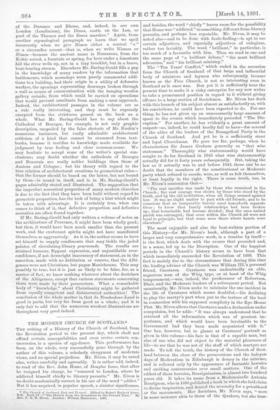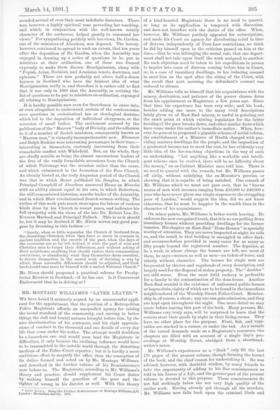THE MODERN CHURCH OF SCOTLAND.*
THE writing of a History of the Church of Scotland, from the Revolution period to the present day, which shall not offend certain susceptibilities and even revive certain con- troversies, is a species of egg-dance. This performance has been, on the whole, very successfully gone through by the author of this volume, a scholarly clergyman of moderate -views, and no special prejudices. Mr. Niven, it may be noted also, writes carefully and agreeably. It is rather odd, indeed, to read of the Rev. John Home, of Douglas fame, that after he resigned his charge, he "removed to London, where he addicted himself chiefly to literary pursuits." Mr. Niven is no doubt academically correct in his use of the word "addict" But it has acquired, in popular speech, a sinister significance, • The Church of Scotland, Past and Present. Baited by Robert Herbert Story, D.D. Book IV.— The Ohoroh from the Revolution to the Present Time," By Rev. T. B. W. Riven. London : William Mackenzie. 1891.
and besides, the word " chiefly " leaves room for the possibility that Home was " addicted" to something different from literary pursuits, and perhaps less reputable. Mr. Niven, it may be noted also—and to be done with fault-finding—is apt to use certain adjectives, and especially adjectives of eulogium, rather too lavishly. The word "brilliant" in particular, is too much of a favourite with him. Thus we read in one and the same page of "a brilliant debate," "the most brilliant advocates," and "his brilliant ministry."
The " Ten Years' Conflict," which ended in the secession from the Church of Scotland of that large and influential body of ministers and laymen who subsequently became known as the Free Church, is not so interesting even in Scotland as it once was. But yet it is sufficiently near the present time to make it a risky enterprise for any new writer to take a pronounced position in regard to it without giving offence to a large section of Scotchmen. Mr. Niven has dealt with this branch of his subject almost as satisfactorily as, with his convictions, he could have been expected to do. For one thing, he has not given up an unnecessarily large amount of space to the events which immediately preceded " The Dis- ruption." For another, he has evidently a great amount of respect—as, indeed, he could hardly fail to have—for several of the abler of the leaders of the Evangelical Party in the Church of Scotland. And yet he is a sufficiently stout and loyal Churchman. He goes too far, perhaps, when he characterises Sir James Graham generally as " that wise statesman." Thoroughly wise statesmanship would have sought to do for Scotland in 1843 what wise statesmanship actually did for it forty years subsequently. But, taking the law as it actually was in and before 1843, there can be no doubt that the members of the constitutional or Moderate party which refused to secede, were, as well as felt themselves, at least legally in the right. There is some truth, too, in Mr. Niven's contention that-
" The real sacrifice was made by those who remained in the Church ; the real courage was shown by those who stood by the truth, and by the old institution, when all things seemed against her. It was no slight matter to part with old friends, and to be conscious that an insuperable barrier must henceforth separate them ; to know that family relationships had been broken up ; that households had become divided; that the once united parish was estranged ; that oven within the Church all wore not loyal to principle, but that some were there whose hearts were elsewhere."
The most enjoyable and also the best-written portion of
this History—for Mr. Niven's book, although a part of a larger and very comprehensive work, is a treatise by itself—
is the first, which deals with the events that preceded and, in a sense, led up to the Disruption. One of the happiest periods in the Church's history seems to have been that which immediately succeeded the Revolution of 1688. This fact is mainly due to the circumstance that during this time the leading adviser of the Church was William M.'s personal friend, Carstares. Carstares was undoubtedly an able, sagacious man of the Whig type, or at least of the Whig temperament,—was, indeed, the predecessor of Robertson, Blair, and the Moderate leaders of a subsequent period. Not unnaturally, Mr. Niven seeks to minimise the one incident in the life of Carstares which seems doubtful,—his declining to play the martyr's part when put to the torture of the boot in connection with his supposed complicity in the Rye House Plot. Mr. Niven allows that Carstares made a declaration under compulsion, but he adds : "It was always understood that he retained all the information which was of greatest im- portance, and which would have been invaluable to the Government had they been made acquainted with it." One has, however, but to glance at Carstares' portrait as given in this volume—his face is that of a capable man, but also of one who did not object to the material pleasures of life—to see that he was not of the stuff of which martyrs are made. To tell the truth, the history of the Church of Scot- land between the close of the persecutions and the halcyon days of Moderatism in Edinburgh is dreary in the extreme, and is relieved only by the appearance of fantastic heresies and exciting controversies over small matters. One of the
oddest of these heresies, Bourignianism, is almost two hundred years old. It takes its name from a Mademoiselle Antonia Bonrignon, who in 1696 published a book in which she laid claim to divine inspiration, and denied the necessity for a priesthood
or the sacraments. Her doctrines, Mr. Niven says, " were in some measure akin to those of the Quakers, but she trim- scended several of even their most indefinite doctrines. There was, however, a highly spiritual tone pervading her teaching, and which, in conjunction with the well-known saintly character of the authoress, helped greatly to commend her views." For sympathising publicly with her views, Dr. Garden, one of the ministers of Aberdeen, was deposed. The heresy, however, continued to spread to such an extent, that ten years after• the deposition of Dr. Garden, when the Assembly was engaged in drawing up a series of questions to be put to ministers at their ordination, one of these was framed expressly to make them disown Bourignianism, along with "Popish, Arian, Socinian, and Arminian tenets, doctrines, and opinions." There are now probably not above half-a-dozen laymen in Scotland who have the faintest idea of what Bourignianism really is, and therefore it is rather odd to find that it was only in 1889 that the Assembly, in revising the list of questions to be put to ministers on ordination, expunged all relating to Bourignianism.
It is hardly possible now even for Scotohmen to enter into, or even altogether to understand, certain of the controversies over questions in ecclesiastical law or theological doctrine which led to the deposition of individual clergymen, or the secession of small bodies. The excitement aroused by the publication of the " Marrow" body of Divinity, and the adhesion to it of a number of Scotch ministers, consequently known as " Marrow men," is virtually incomprehensible now. Ebenezer and Ralph Erskine were interesting personages in their time,— interesting in themselves, curiously interesting from their
remarkable conflict with Whitefield. But, on the whole, they are chiefly notable as being the almost unconscious leaders of the first of the really formidable secessions from the Church of which Patronage was the occasion rather than the cause, and which culminated in the formation of the Free Church. As already hinted at, the truly Augustan period of the Church was that in which Home published his Douglas, in which Principal Campbell of Aberdeen answered Hume on Miracles with an ability almost equal to his own, in which Robertson, the still-remembered historian, was the leader of the Assembly,
and in which Blair revolutionised Scotch sermon-writing. The author of this work puts much store upon the labour of various kinds done by his Church in recent years, and indicates his full sympathy with the views of the late Dr. Robert Lee, Dr. Norman Macleod, and Principal Tulloch. This is as it should be, but it may be doubted if Mr. Niven serves any. good pur- pose by dreaming in this fashion :—
" Surely, when so little separates the Church of Scotland from -the dissenting Churches, when they have so much in common in ancient tradition and the records of the past, when the days of the secessions are so far left behind, it were the part of wise and Christian men to forget their differences, and without asking of their neighbours anything that should violate their conscientious convictions, or abandoning what they themselves deem essential, to devote themselves to the sacred work of devising a way by which these miserable differences should be adjusted, and Scot- land should once more be blessed with a united National Church."
Mr. Niven should propound a practical scheme for Presby- terian Reunion in Scotland,—if he has one. Is it Concurrent Endowment that he is driving at ?



































 Previous page
Previous page